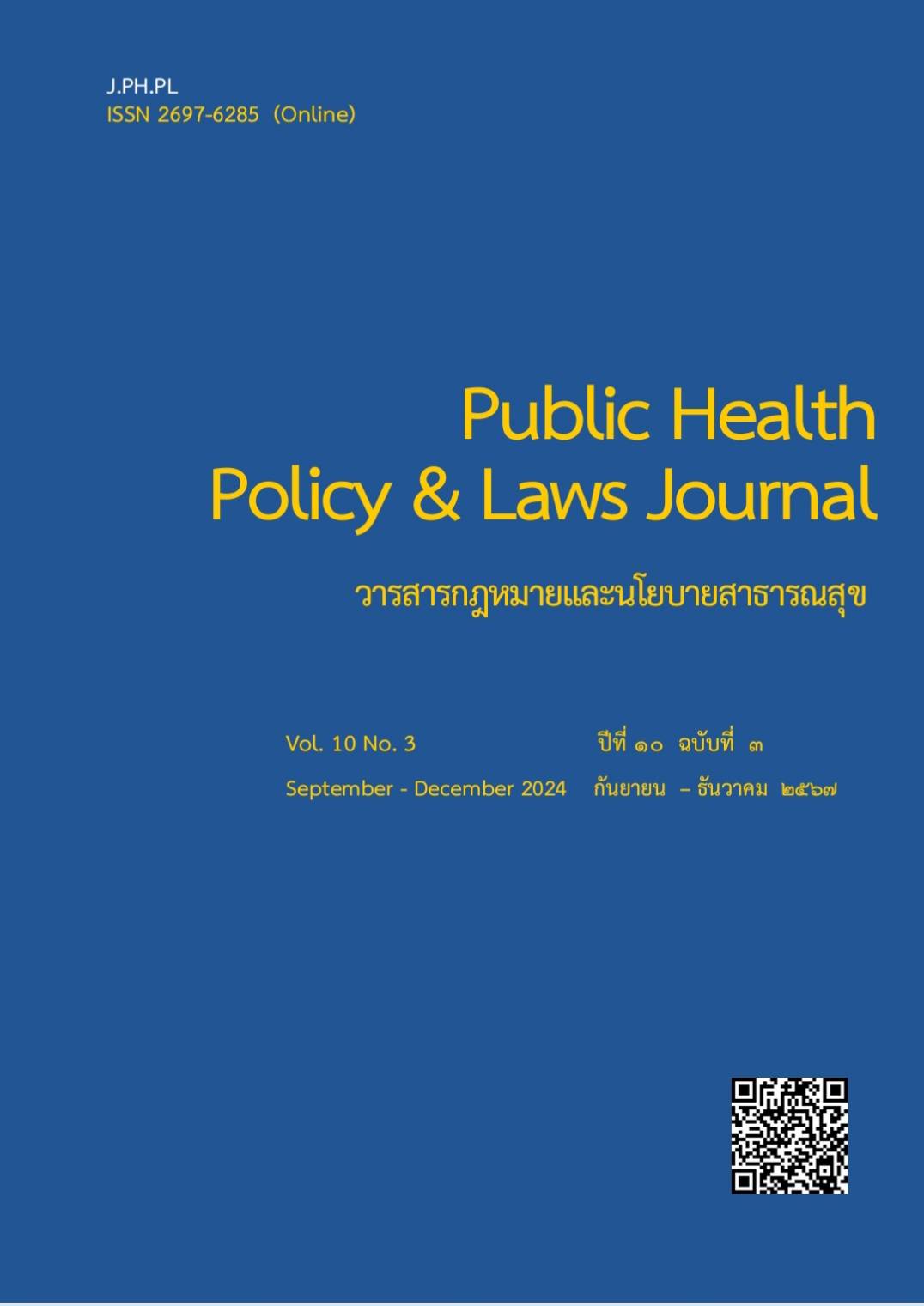Satisfaction on the Welfare and Stress Level among New Recruits in the Royal Thai Army at the 4th Army area, Wachirawut Camp
Keywords:
Satisfaction, Stress, Coping Mechanisms, New Recruits, Thai MilitaryAbstract
This cross-sectional analytical study aimed to assess stress levels, satisfaction on the welfare, and coping mechanisms among new recruits in the 4th Army area, Wachirawut Camp, Thailand, and to analyze their associations with stress levels. Data were collected from 231 participants using a self-administered questionnaire. Descriptive statistics and chi-square tests were employed for data analysis.
The results showed that he majority of participants (67.1%) voluntarily enlisted, with a mean age of 21.7 years. Educational attainment primarily consisted of high school completion (35.9%). The predominant religion was Buddhism (70.1%), and most participants were single (83.1%) with prior laborer experience (38.5%). No pre-existing medical conditions were reported, and 40.3% were smokers. Overall, 51.1% of the participants reported no or low stress, while 37.7% and 11.2% reported moderate and high stress levels, respectively. Participants utilized both problem-focused and emotion-focused coping strategies. Satisfaction with the practice environment, living condition, nutrition, and healthcare access was good, while satisfaction with assigned roles was moderate. Income adequacy, living conditions, assigned duties, and healthcare access within the unit significantly associated with stress levels. In conclusions, regular assessments of welfare satisfaction by relevant agencies and supervisors are recommended. Evaluation results should be used to improve the quality of military service, define appropriate roles, and optimize responsibilities.
References
Chutha, w., Makkhlai, K., Sriruengrat, D. & Jayana, R. (2023). The prevalence and trends of mental health problems during the COVID-19 pandemic in Thailand, 2020 – 2022. Journal of Mental Health of Thailand. 2023;31(3):227-39. [In Thai]
Department of Mental Health, Ministry of Public Health. Mental health check in. https://dmh.go.th/test/
Dickinson, A. & Manorom, A. (2014). Stress relating to the conduct of operational duties among the personnel of task force 1 Suranaree Field Force and solutions to deal with the problem. Journal of Liberal Art Ubon Ratchathani University, 11(1),117-140. [In Thai]
Duangurai, A. & Taephant, N. (2017). Psychological Experiences of Posttraumatic Growth in Veterans. Journal of The Royal Thai Army Nurses, 18(Supplement), 189-197. [in Thai]
Kensila, U. & Kensila, J. Depression of Royal Thai Air Force Soldiers Wing 23 Udon Thani proceedings of Ratchathani University national conference 2017; 2017 July 26-27; Ubonrachathani, 2017: 109-49. [in Thai]
Khantong, P. & Nimnuan, C. (2011). Mental health problems of new Thai army recruits in PhraMongkutklao Hospital. Chulalongkorn Medical Journal, 55(2),181-192. DOI: https://doi.org/10.58837/CHULA.CMJ.55.2.8 [in Thai]
Leelukkanaveera, Y., Longphimai, C. & Toonsiri, C. (2018). Influencing factors of stress among the Royal Thai Navy in Narathiwat province. Royal Thai Navy Medical Journal, 45(2), 399-416. [in Thai]
Mangana, N., Ananthanatorn, A., Yossomsakdi, S. & Prateep, C. (2020). A study of work stress of among the soldier of 11 Paramilitary Regiment Task Force in Amphoe Waeng and Amphoe Sukirin, Narathiwat. Journal of Politics, Administration and Law, 12(2), 335-355. [in Thai]
Nualsuwan, K., Prasittivatechakool, A. & Prajankett, O. (2012). Stress and coping strategies of the Royal Thai Army New Privates. Journal of The Royal Thai Army Nurses, 13(2), 72-81. [in Thai]
Preecha, M. & Thavichachart, N. (2012). Factors related to stress and stress management behaviors of border patrol police company 446 in Narathiwat Province. Chula med J, 56(2), 243 - 258. [in Thai]
Rukskul, I. (2011). Mental health status and attitudes among the Royal Thai Army personnel deployed for the peace building process in southernmost provinces of Thailand. RTA Med J, 64 (2), 67-73. [in Thai]
Senanayake, B., Wickramasinghe, I., Edirippulige, S. & Arambepola, C. (2020). stress and its social determinants - a qualitative study reflecting the perceptions of a select small group of the public in Sri Lanka. Indian Journal of Psychological Medicine, 42(1), 69–79. https://doi.org/10.4103/ IJPSYM.IJPSYM_482_18
Thai health report project. (2023). Thai health. Institute for Population and Social Research, Mahidol University. https://www.thaihealth.or.th/e-book
Thongta, N. (2022). Satisfaction on the welfare of staffs in the 3rd infantry battalion, 21st Infantry Regiment Queen's. [Master degree, Burapha University]. [in Thai]
Turliuc, MN. & Balcan, AD. (2023). Stress and psychological well-being in Military Gendarmes. Soc. Sci. 2023, 12, 517. https://doi.org/10.3390/socsci12090517
World Health Organization. (2013). Comprehensive mental health action plan 2013–2020. WHO. https://www.who.int/mental_health/action_plan_2013/ bw_version.pdf?ua=1
Yungyuen, W. & Waleeprakhon, P. (2020). Factors Associated with Depression in New Conscripts. J Psychiatr Assoc Thailand, 65(2), 105-116. [in Thai]
Downloads
Published
How to Cite
Issue
Section
License
Disclaimer and Copyright Notice
The content and information presented in articles published in the Journal of Law and Public Health Policy represent the opinions and sole responsibility of the respective authors. The editorial board does not necessarily agree with or assume any responsibility for the views expressed.
All articles, data, content, images, and other materials published in the Journal of Law and Public Health Policy are the intellectual property of the journal. Any individual or organization wishing to reproduce, distribute, or otherwise use the entirety or any part of such materials must provide proper citation.





